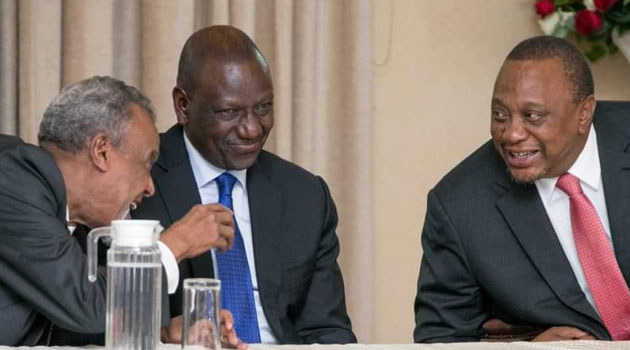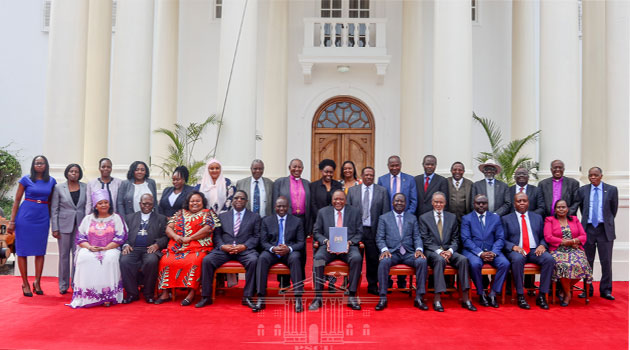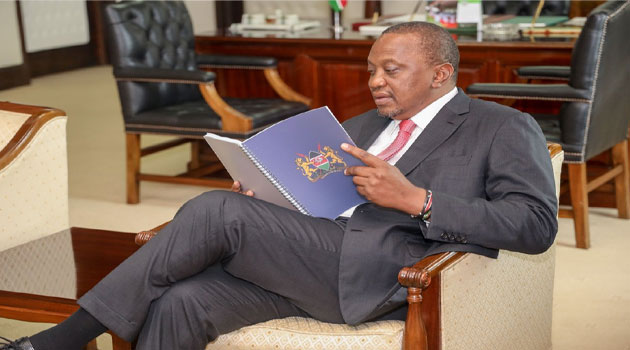
Kenya’s top three leaders: President Uhuru Kenyatta (centre), his Deputy William Ruto (left) and former Prime Minister Raila Odinga (right). /PSCU).
NAIROBI, Kenya, Nov 27- In a departure from the winners take it all culture after a presidential election, the Building Bridges Initiative (BBI) task force proposes that the runners-up of the Presidential election become an ex-officio Member of Parliament and the Leader of the Official Opposition.
His or her party, the report recommends, must not be represented in the Government, or of a coalition of Parliamentary parties not represented in the Government.
“The party or coalition of parties that are not in Government shall be the Official Opposition,” reads part the report set to be made public at the Bomas of Kenya, and which was exclusively obtained by Capita FM News soon after it was handed over to President Uhuru Kenyatta on Tuesday.
President Uhuru Kenyatta received the report on Tuesday, in the presence of his Deputy William Ruto, Orange Democratic Movement (ODM) leader Raila Odinga and dozens of select leaders from across the country.
The leader of the official opposition, the report suggests, shall be enabled to have a Shadow Cabinet.
The report covers on 7 thematic areas, that focus on empowering devolution, need for a lean government that invests on the people as the central mandate, inclusive and accountable politics that will see the creation of a ceremonial Prime Minister’s position, equitable distribution of resources and ways of empowering national ethics.
In an innovative approach to fight corruption, the single threat to Kenya’s unity, economy, and resources, the report proposes that whistleblowers are rewarded with 5 percent of recovered proceeds.
The report recommends 6 measures, that the 14-member committee believes that they will help in slaying the graft dragon, which has seen billions of taxpayer’s resources embezzled.
Other recommendations include a requirement to make all wealth declaration forms open to public scrutiny and enable court procedures that guarantee the protection of the safety and security of informants, whistleblowers and witnesses, particularly regarding terrorism, serious transnational crimes and corruption.
The task force, that was chaired by Senator Yusuf Haji, also seeks to make the country 100 percent e-service nation by digitalizing all government services, processes, payment systems, and record-keeping, protecting the independence of media and judiciary.

President Uhuru Kenyatta, Deputy President William Ruto and Senator Yusuf Haji during the presentation of the BBI report on November 26, 2019. /PSCU.
On protecting the Judiciary independence, the report recommends that there is an effort to ensure “Increased public confidence in the Judiciary, by recognizing that the core constitutional principles in Kenya are the separation of powers, between arms of Government, and accountability to the people of Kenya. The independence of the Judiciary must be protected as a fundamental principle, and it should also be accountable to the people of Kenya.”
It also recommends that all public officers be banned from doing business with the government. This law exists currently but lacks proper enforcement mechanisms.
If adopted, the proposal will come at a time key Government agencies–the Directorate of Criminal Investigations (DCI), the Office of the Director of Public Prosecutions (ODPP) and the Ethics and Anti Corruption Commission (EACC) are making efforts to fight the vice.
“The growing public perception of Kenya having a rigged system that rewards cronyism and corruption is the greatest risk to Kenya’s cohesion and security. Tackling corruption is the single most important mission Kenya has now. The Taskforce makes major and actionable recommendations, a few that are captured below,” the report states in part.
Kenya is the 144 least corrupt nation out of 175 countries, according to the 2018 Corruption Perceptions Index reported by Transparency International.

President Kenyatta, DP Ruto and former Prime Minister Raila Odinga with members of the task force that prepared the BBI report. /PSCU.
Prime Minister’s post
On the creation of a Prime Minister’s seat, the BBI report reads that; “Within a set number of days following the summoning of Parliament after an election, the President shall appoint a Prime Minister, an elected Member of the National Assembly from a political party having a majority of Members in the National Assembly or, if no political party has a majority, one who appears to have the support of a majority of MPs.”
The nominee for Prime Minister, the report reads, “shall not assume office until his or her appointment is first confirmed by a resolution of the National Assembly supported by an absolute majority vote of MPs.”
“If the Prime Minister nominee is not confirmed, the President shall have another set number of days to make another appointment. This process shall continue until there is a successful nomination for Prime Minister. A measure to ensure that this process is not indefinite, and that governance is continuous should be considered.”

Raila Odinga who has previously served as Kenya’s Prime Minister in a power-sharing agreement with then President Mwai Kibaki. /PSCU.
The Prime Minister may be dismissed by the President or through a vote of no confidence in the National Assembly according to the set of recommendations.
To ensure the Cabinet represents the face of Kenya, the President will only appoint Cabinet Ministers after consultation with the Prime Minister.
“The Ministers shall be responsible for the offices that the President establishes in line with the Constitution,” reads the recommendations.
But what are the roles of a Prime Minister?
According to the BBI report, “The Prime Minister shall have supervision and execution of the day-to-day functions and affairs of the Government. The Prime Minister shall be the Leader of Government Business in the National Assembly. On the President’s tasking, the Prime Minister will chair Cabinet sub-committees. In the exercise of his authority, the Prime Minister shall perform or cause to be performed any matter or matters which the President directs to be done.”
The Taskforce further recommends that the Cabinet Secretaries be renamed Cabinet Ministers. There also want a set of legislators assume the position of a Minister of State-shadow cabinet-in a move, the Yusuf Haji led taskforce say will ensure accountability.
The ministers of state shall not have additional salary or benefits, according to the proposals, but they shall work closely with the Cabinet Ministers in their respective dockets.
Ballooning Wage Bill
On reducing the wage bill, the report, among others recommends that all sitting allowances for Public Officers on salary are eliminated.
The report did not propose any change in the term limit for the President and his Deputy, which remain two-five years under the current Constitution.
The report is an outcome of the March 2018 handshake between President Kenyatta and his then political archrival Raila Odinga, following a disputed election.

President Kenyatta and former Prime Minister Raila Odinga shook hands on the steps of Harabee House in March 2018. CFM-FILE.









































